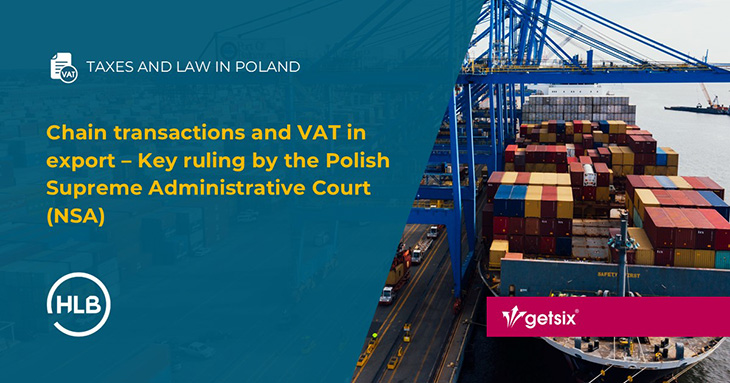Chain transactions and VAT in export – Key ruling by the Polish Supreme Administrative Court (NSA)
Chain transactions have long raised serious practical and interpretative doubts in the context of VAT – particularly when it comes to exports to third countries. One of the main challenges is determining which supply in the chain qualifies as the moving supply (and may therefore benefit from the 0% VAT rate) and which is a non-moving (domestic) supply subject to VAT in Poland. A crucial criterion here is identifying the moment when the right to dispose of goods as owner is transferred.
In its judgment of 28 January 2025 (case ref. I FSK 1389/21), the Polish Supreme Administrative Court (NSA) clarified when an intermediary in a supply chain may treat a transaction as an export and when the application of the 0% VAT rate is unjustified.
In this article:
Background: export via anintermediary
The case concerned a company operating in the steel structures industry. The sales model was typical for chain transactions:
- Company A sold goods to a Polish purchaser (B),
- Purchaser B resold the goods to a third-country customer (C),
- The goods were shipped directly from Company A (or its subcontractor) to customer C outside the EU.
The delivery terms proved crucial:
- The A → B supply was carried out under EXW/FCA terms – meaning that the risk and the right to dispose of the goods passed to the purchaser already in Poland.
- Purchaser B was responsible for organizing transportation and customs clearance and bore all transport-related risks.
- Company A received proof of export (the IE-599 message), but the declared consignor was Purchaser B.
The dispute over the 0% VAT rate
Company A argued that since the goods were leaving the EU and proper export documents were available, it had the right to apply the 0% VAT rate. However, the Director of the Polish National Tax Information (KIS) disagreed, stating that the A → B transaction was a domestic supply, and only the B → C supply could be treated as an export.
The Provincial Administrative Court in Poznań sided with the company, but the NSA reversed the ruling and dismissed the complaint.
This dispute illustrates how widely interpretations can vary between Polish tax authorities and courts.
Key position of the Supreme Administrative Court
In response to the cassation complaint filed by the Director of the National Tax Information, the Polish Supreme Administrative Court (NSA) reassessed the transaction and took a different view than the first-instance court. According to the NSA, the decisive factor was who, at each stage of the transaction, held the right to dispose of the goods as owner, and who organized the transport to the third country.
The NSA confirmed that:
- The right to dispose of the goods as owner passed to Purchaser B already in Poland – under the EXW/FCA delivery terms,
- Purchaser B organized the transport and acted on its own behalf,
- The transport must be attributed to the B → C supply, which is the moving (export) supply,
- The A → B supply is a domestic, non-moving supply and therefore not eligible for the 0% VAT rate.
The NSA also emphasized that merely holding a document confirming export outside the EU (such as the IE-599 message) is not sufficient if it is not the first supplier (Company A) who organizes the transport and retains the right to dispose of the goods during the transport process.
What does this mean for businesses?
This judgment highlights several risks associated with chain transactions in export:
- Misclassifying the nature of the supply (e.g., applying 0% VAT to a domestic supply) can lead to VAT arrears,
- Delivery terms (Incoterms) are important but not decisive – the actual transfer of ownership rights is critical,
- Customs export documents, such as the IE-599, do not automatically confirm entitlement to the 0% VAT rate.
How to minimize risk?
To avoid disputes with Polish tax authorities and mitigate VAT-related risks:
- Thoroughly document the transaction – who is responsible for transport, who bears the cost, and who handles customs procedures;
- Carefully review Incoterms, but do not rely solely on them;
- Verify who acquires the right to dispose of the goods as owner at the moment of loading and transport;
- Consult with a tax advisor – especially when goods are exported outside the EU.
The discussed ruling by the Polish Supreme Administrative Court once again highlights how ambiguous and dispute-prone the rules on chain transactions in export remain – particularly when the transport is organized by an intermediary. Diverging interpretations between administrative courts and tax authorities show that even properly documented exports may face challenges in applying the 0% VAT rate.
As a result, each chain transaction must be assessed individually, with particular attention paid to the moment the right to dispose of goods as owner is transferred, not just the formal delivery terms defined by the Incoterms.
Given the lack of consistent interpretation in Polish case law, companies should act with caution – even a minor error in attributing transport may result in serious tax consequences. In such cases, it is advisable to seek professional support from tax advisors, who can help accurately classify the transaction structure and minimize the risk of disputes with the authorities.
If you have any questions regarding this topic or if you are in need for any additional information – please do not hesitate to contact us:
CUSTOMER RELATIONSHIPS DEPARTMENT

ELŻBIETA
NARON-GROCHALSKA
Head of Customer Relationships
Department / Senior Manager
getsix® Group
***














